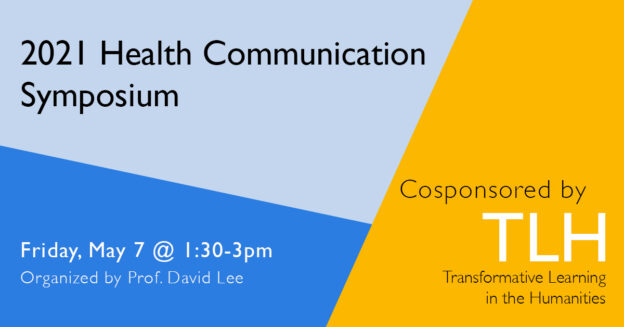by David H. Lee, Ph.D., Assistant Professor of Communication, Department of Humanities, New York City College of Technology
There are large disparities in health outcomes for New Yorkers according to race, gender, income, education, ability, etc. CUNY students from low-income families and racialized groups are among the hardest hit by the SARS-CoV-2 pandemic and among the most impacted by furloughs, unemployment, and crowded living conditions.
The 2021 Health Communication Symposium at City Tech was a public forum on health disparities. The event took place online and included guests and speakers from around the world. There were over eighty people on the call.
Ann Delilkan, Chair of the Humanities Department, made opening remarks about a new Bachelor of Science degree in Health Communication being offered at City Tech. Welcoming remarks were also made by School of Arts and Sciences Dean, Justin Vazquez-Poritz, Associate Provost Reginald Blake, and Provost Pamela Brown. Gary L. Kreps, University Distinguished Professor of Communication and Director of the Center for Health and Risk Communication at George Mason University, noted the necessity of vaccination to obtain herd immunity.
The plenary address, from Dr. Lisa Grace-Leitch, Associate Professor and Deputy Chair of the Health Education Department at Borough of Manhattan Community College, was entitled “Examining Health Disparities in the Diagnosis, Treatment, and Care of Black Women with Autoimmune Disease.” The presentation illustrated the disproportionate incidence of autoimmune disease (such as multiple sclerosis, lupus, psoriasis, and others) among black women. Stress from food insecurity, income disparities, systemic racism, incarceration, etc. is implicated in the onset of more than eighty different autoimmune disorders.
After the plenary session, there were three half-hour parallel sessions in breakout rooms. In room one, Amanda Almond, Associate Professor of Psychology from the City Tech Department of Social Sciences, presented “Methods for Studying Race and Health.” In room two, Linda Bradley from the City Tech Department of Nursing brought together a panel of speakers from other departments, including Thalia Pericles (from Hospitality Management), and Nandi Prince (from the City Tech Library). Their panel, entitled “Interdisciplinary Reflections on COVID-19,” looked at the impact of COVID on their respective fields. In the third room, Dr. Dionne Bennett, from City Tech’s African American Studies Department, presented “Intersectionality, Intersubjectivity, and Representations of Gendered Racial Trauma.” Each room was well attended with about twenty-five participants.
The keynote speaker was Mohan J Dutta, Dean’s Chair Professor of Communication at Massey University (New Zealand) and Director of the Center for Culture-Centered Approach to Research and Evaluation (CARE). Dutta’s Google Scholar page lists 364 publications and over eleven thousand citations. He is the author of books such as Communicating Health: A Culture-centered Approach (2008) and Neoliberal Health Organizing: Communication, Meaning, and Politics (2015), among others.
Dutta’s presentation was a critique of business as usual in public health communication. He identified what he terms “neoliberal strategies,” which view health as mostly a result of individual choices rather than structural determinants. Dutta noted that the idea of “targeting” at-risk groups perpetuates an ideology of whiteness, and proposed, instead, “learning to learn from below,” citing Gayatri Spivak. As examples of culturally centered communication-based health interventions, he noted women agriculturalists in India “taking back the communicative apparatus” and creating their own media, plus other examples.
After the Symposium ended, I hung around for another hour talking with students. One of my students, Melky Saint-Surin, expressed hope that events such as this might help raise consciousness and focus energy on the problem of health disparities.
Thank you to Transformative Learning in the Humanities for sponsoring this event, and for their generous support for Health Communication majors. Special thanks to Christina Katopodis.


